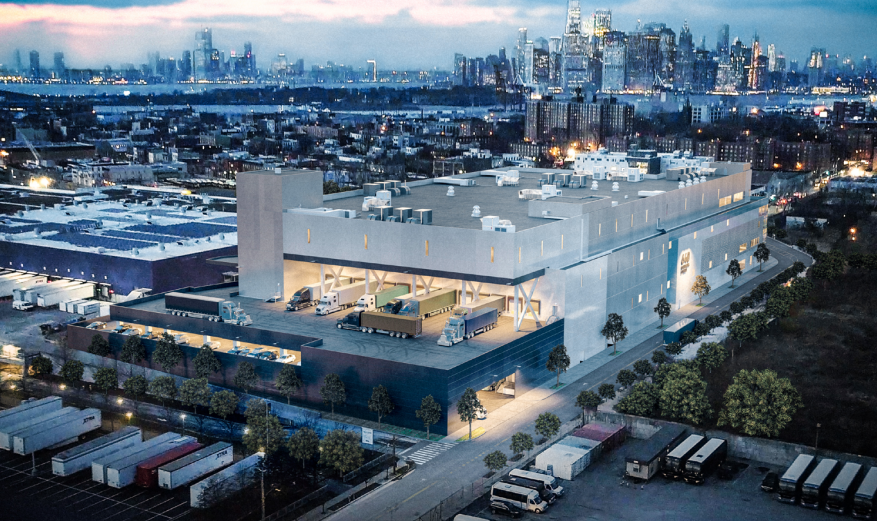Waterfront Residents Again Raise Alarms About Last Mile Warehouses, “Truckpocalypse.”
The last-mile distribution centers—where merchandise is sorted before being delivered to customers throughout the city—are becoming increasingly common: at least five distribution centers are in the works in Red Hook alone.

Since at least 2019, residents in the waterfront neighborhoods of Red Hook and Sunset Park have voiced concerns that an influx of last-mile delivery warehouses in the area could lead to a debilitating, unsafe increase in truck traffic. But at a recent community board meeting, the city’s transportation and land use agencies offered little in the way of specific solutions.
The last-mile distribution centers—where merchandise is sorted before being delivered to customers throughout the city—are becoming an increasingly common part of the landscape in the area: at least five distribution centers are in the works in Red Hook alone, including two leased by Amazon at 640 Columbia Street and 280 Richards Street, and a giant UPS facility near the Valentino Pier. In total, the facilities will encompass millions of square feet of space in the area.
That growth, driven in large part by the boom of e-commerce, threatens to flood the peninsular neighborhood with trucks and delivery vans, which some residents say could create challenges with pollution, traffic congestion, and street safety.
“The buildings on Van Brunt Street cannot take that amount of truck traffic, but neither can the lungs inside of public housing,” said Karen Blondel, a local community leader and resident of the Red Hook Houses, at a joint virtual meeting of Brooklyn Community Boards 6 and 7 organized to discuss the issue.
The meeting, which took place on July 22nd, came two months after an earlier meeting of the group, and days after a walk-through organized by Council Member Carlos Menchaca to discuss responses to the challenge. As they have in the past, local organizers voiced a number of ideas to avoid what some referred to as a “truckpocalypse,” including requiring waterfront warehouses to receive shipments by boat, and reworking the area’s truck routes.
They also want to see a comprehensive traffic study for the area, and a temporary moratorium on new last-mile warehouses, something that has the support of the outgoing local Council Member Carlos Menchaca.
But staffers from the city’s Department of City Planning (DCP), Department of Transportation (DOT) and its Economic Development Corporation (EDC) who attended the meeting had relatively little to offer in response to residents voicing concerns.
Because much of the Red Hook and Sunset Park waterfront is zoned for manufacturing uses, last-mile warehouses can be built there without special permits or environmental impact studies, city planning officials said. Changing that would require updates to the zoning code.
DOT officials said they planned to install improved wayfinding signage in the area to ensure truck drivers followed existing routes. Diniece Mendes, Director of the agency’s Office of Freight Mobility, also outlined several longer-term and citywide initiatives spearheaded by the department, including the May publication of a Smart Truck Management Plan that explores several potential strategies like off-hour deliveries, better curb access, and incentives for companies to use greener trucks and cargo bikes.
“E-commerce and last-mile distribution has certainly created a lot of conversation and also concerns throughout the city, but also nationally and internationally,” Mendes said.
But the agency has not committed to the traffic study residents have been asking for since 2018, and it remains unclear whether the citywide approaches outlined in DOT’s truck plan will be fast or impactful enough to mitigate the impact of the new warehouses in Red Hook and Sunset Park, many of which are scheduled to come online within the next year and a half.
“I do traffic duty and crossing guard duty in the morning,” Jo Goldfarb, who works at Red Hook’s BASIS Independent Brooklyn school, said at the meeting. “And I just plead with this council: please, please ask questions about how much a community can take.”




